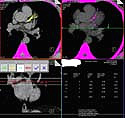| Cardiac
CT
 This
is a procedure performed using a multi-slice CT. The
current multi-slice CT that exquisitely produces coronary
artery images, is a 64-slice CT scanner from Siemens. This
is a procedure performed using a multi-slice CT. The
current multi-slice CT that exquisitely produces coronary
artery images, is a 64-slice CT scanner from Siemens.
This scanner has a special x-ray
tube and rotation speed, capable of performing 3 rotations
in a second. In each rotation, 64-slices are produced,
giving us approximately 194 slices per second. This
is the fastest scanner in the industry, currently.
Speed is extremely important in
our ability to "freeze" the heart. Since
the heart is a rapidly moving structure, the only
way to image structures within it, is if we can scan
as fast as the heart beats or close enough.
All scans are gated to the ECG trace.
This allows us to position our data acquisition accurately
in specific phases.
Using this modality we can perform
the following procedures as part of a cardiac CT examination.
1.Calcium Scoring
2.Coronary artery imaging
3.Functional assessment
Calcium Scoring
Calcium scoring is a technique where
the extent of calcification in the coronary arteries
is measured and scored. It has been around for many
years and was initially performed using EBCT (electron
beam CT), but is now increasingly performed using
multi-slice CT. As a rule, the faster the scanner,
the more accurate is the calcium scoring.
There is a direct correlation between
the extent of calcium in the coronary arteries and
the risk of a future cardiac event. For example, a
calcium score of more than 400 is considered severe
and it would be necessary to take steps to prevent
further advancement of atherosclerosis and plaque
formation. The higher the calcium score, more likely
is there a chance of severe stenosis as well.
A calcium score of 0 does not rule
of soft plaques, but statistically rules out significant
coronary artery disease. Though the calcium score
does not show soft plaques (which however are best
seen on a CT angiogram), the higher the calcium score,
the more is it likely that there are soft plaques
as well. Rupture of a soft plaque is the commonest
cause of an acute coronary syndrome (i.e. a heart
attack).
Calcium scoring is offered as a
separate stand-alone test, but more and more, since
we are reliably able to assess the coronary arteries
themselves, it is being performed an an initial part
of the entire cardiac CT examination.
|




 This
is a procedure performed using a multi-slice CT. The
current multi-slice CT that exquisitely produces coronary
artery images, is a 64-slice CT scanner from Siemens.
This
is a procedure performed using a multi-slice CT. The
current multi-slice CT that exquisitely produces coronary
artery images, is a 64-slice CT scanner from Siemens.
